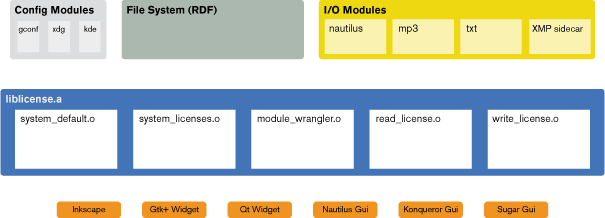Difference between revisions of "Liblicense"
Paulproteus (talk | contribs) (dreamy) |
|||
| Line 18: | Line 18: | ||
* Extract and write license information for files | * Extract and write license information for files | ||
| − | |||
* Supports enumeration of available licenses | * Supports enumeration of available licenses | ||
* Wraps internationalized license information for Creative Commons licenses | * Wraps internationalized license information for Creative Commons licenses | ||
| Line 24: | Line 23: | ||
* Extensible support for file types using module system | * Extensible support for file types using module system | ||
* No specific GUI library dependency allows applications to build the graphical chooser most appropriate for their platform. | * No specific GUI library dependency allows applications to build the graphical chooser most appropriate for their platform. | ||
| + | |||
| + | == Features in our dreams == | ||
| + | * Supports [[WebStatement|verification]] URLs for metadata verification | ||
| + | |||
== Architecture == | == Architecture == | ||
Revision as of 19:59, 29 January 2008
Low-level license metadata integration for applications.
liblicense provides a straight-forward way for developers to build license-aware applications. liblicense utilizes a pluggable module system for reading and writing metadata from specific file types, allowing extensibility for specific content types.
Features
- Extract and write license information for files
- Supports enumeration of available licenses
- Wraps internationalized license information for Creative Commons licenses
- Bindings for dynamic languages (currently Python and Ruby)
- Extensible support for file types using module system
- No specific GUI library dependency allows applications to build the graphical chooser most appropriate for their platform.
Features in our dreams
- Supports verification URLs for metadata verification
Architecture
Bindings
Download
- Latest Release from Sourceforge.net
- Checkout liblicense module from SVN
- Debian and Ubuntu repositories.
- Read the tutorial.
More Information
- Release History and Roadmap
- Desktop Integration
- Screenshots
- RDF Reference
- Library Documentation (generated from source)
